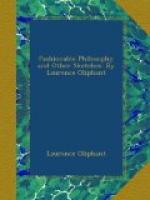Taking me in their arms, I now found, was a mere formula or figure of speech, and consisted only in throwing garlands over me. Still I was much comforted, not merely by the grace and cordiality of their welcome, but by the mention of Ila, whose name will doubtless be familiar to my readers as occurring in a Sanscrit poem of the age immediately following the Vedic period, called the Satapathabrahmana, when Manu was saved from the flood, and offered the sacrifice “to be the model of future generations.” By this sacrifice he obtained a daughter named Ila, who became supernaturally the mother of humanity, and who, I had always felt, has been treated with too little consideration by the mahatmas—indeed her name is not so much as even mentioned in Mr Sinnett’s book. Of course it was rather a shock to my spiritual pride, that I, a mahatma of eminence myself, should be told that I was to be adopted as a mere chela by these ladies; but I remembered those beautiful lines of Buddha’s—I quote from memory—and I hesitated no longer:—
“To be long-suffering and
meek,
To associate with the tranquil,
Religious talk at due seasons;
This is the greatest blessing.”
“To be long-suffering”—this was a virtue I should probably have a splendid opportunity of displaying under the circumstances,—“and meek”; what greater proof of meekness could I give than by becoming the chela of women? “To associate with the tranquil.” I should certainly obey this precept, and select the most tranquil as my associates, and with them look forward to enjoying “religious talk at due seasons.” Thus fortified by the precepts of the greatest of all teachers, my mind was at once made up, and, lifting up my voice, I chanted, in the language of the occult, some beautiful stanzas announcing my acceptance of their invitation, which evidently thrilled my hearers with delight. In order to save unnecessary fatigue, we now transferred ourselves through space, and, in the twinkling of an eye, I found myself in the enchanting abode which they called their home, or dama. Here a group of young male chelas were in waiting to attend to our wants; and the remarkable fact now struck me, that not only were all the women lovely and the men handsome, but that no trace of age was visible on any of them. Ushas smiled as she saw what was passing in my mind, and said, without using any spoken words, for language had already become unnecessary between us, “This is one of the mysteries which will be explained to you when you have reposed after the fatigues of your journey; in the meantime Asvin,”—and she pointed out a chela whose name signified “Twilight,”—“will show you to your room.” I would gladly linger, did my space allow, over the delights of this enchanting region, and the marvellously complete and well-organised system which prevailed in its curiously composed society. Suffice it to say, that in the fairy-like pavilion




